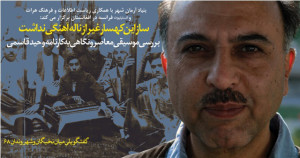
The 68th Goftegu public debate of Armanshahr Foundation (5th year) was organised in Herat, in cooperation with the Information and Culture Directorate of Herat Province to discuss contemporary music and the work of Vahid Qassemi, a leading contemporary musician. Around 250 people attended the meeting, where the new books of Armanshahr were distributed. In conclusion of the meeting, Vahid Qassemi gave a framed picture of Master Sarahang to the Music Department of Herat as remembrance. The Music Department, in turn, awarded a Plate of Honour to Mr. Qassemi.
Maruf Kabiri, writer and poet, opened the meeting by a review of the work of Vahid Qassemi. In his introductory remarks, however, he pointed out the sorrowful state of critique. He said: Art has a heavy responsibility in this society, but music is not moving on a worthy path today. Mr. Kabiri then went on to describe Qassemi as a researcher, composer and artist, and one of the few artists, who are writing and working on a goal-oriented path, and pointed out: Qassemi has managed to combine combative literature with his music so effectively that every listener years for freedom, for example in his song with the lyrics of the late Fani:
Rue! Nest of eagles has burnt down
The forest caught fire and the birds burnt down
Where are you Rostam
To see that Kabulstan has burnt down
Cry you homeless nightingale
The orangery and vines of Parwan burnt down
Mr. Kabiri revealed: The master sang the lyric when a group of dark-hearted people were trying to burn down the orangeries and vineyards of the north. Endeavours of Vahid Qassemi to reconstruct the folkloric songs are worthy of praise. They play a worthy role in saving our folkloric songs.
The second speaker, Naqib Arvin, said: Contemporary music is not an issue for today only; contemporary life is changing all the time. The speed of change in modern societies, and even in Afghanistan, has brought humans out of cosiness. He then asked: Should our composer try to retain the roots of the native music or hear the new and changing sounds in the world and join the trend of change?
To discuss Qassemi’s work, Arvin alluded to the developments in early 1980s: “Extensive developments took place in all levels of life in Afghanistan starting in early 80s. Although those years are considered years of catastrophe for us in many aspects, we also went through undeniable progress especially in the field of culture.
In his opinion, Vahid Qassemi is a distinguished musician of the past three decades in Afghanistan, who represented a new generation. “As a young composer, he was well aware of the roots of his native music and employed the modern means to create a development in music.”
The next speaker, Mr. Vali Shah-Bahra, director of Information and Culture in Herat had planned to speak about the state of contemporary music, but an urgent engagement persuaded him to speak briefly about the significance of music and Qassemi’s record and leave the stage to Mr. Qassemi.
Mr. Qassemi began by fielding questions. The moderator asked: The background of our music today is the Indian classical music. The background of Indian classical music is the Khorassani music. What is the state of Khorassani music in Afghanistan today and why is it important to deal with it?
Mr. Qassemi said: “The works of Khorassani music indicate that our land possessed great music, and Herat was the centre of nurturing this music. Only two important specialised works remain on the Khorassani music: Behjat al-Rouh, by Safiyedding Herawi (6th century) and a book with the title of Music Treatise by Mowlana Banaei Herawi. The two books are two academic reference works on theory of music in that era. They both bear witness to the existence of music in that era, and refer to the theory and basis of music as Khorassani and Persian music.
Subsequently, Mr. Qassemi spoke about pop music in Afghanistan and musicians who had worked in this field. He also played samples of their works on harmonium. Finally, he sang one of his own songs at the request of the audience.
An 8-minute teaser of the work of Vahid Qassemi as well as two songs by local artists from Badakhshan in a concert organised by Mr. Qassemi in Babar Garden of Kabul, were also played.
Invitation for 68th Goftegu public debate: Contemporary music & work of Vahid Qassemi


